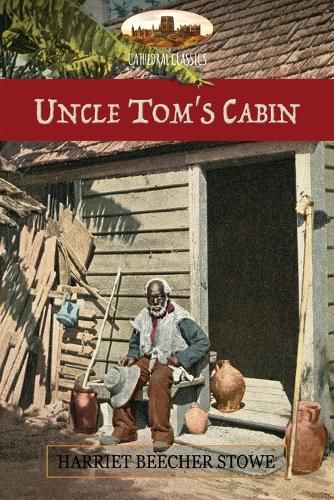Readings Newsletter
Become a Readings Member to make your shopping experience even easier.
Sign in or sign up for free!
You’re not far away from qualifying for FREE standard shipping within Australia
You’ve qualified for FREE standard shipping within Australia
The cart is loading…






This title is printed to order. This book may have been self-published. If so, we cannot guarantee the quality of the content. In the main most books will have gone through the editing process however some may not. We therefore suggest that you be aware of this before ordering this book. If in doubt check either the author or publisher’s details as we are unable to accept any returns unless they are faulty. Please contact us if you have any questions.
Uncle Tom’s Cabin - the bestselling novel of the 19th century - was instrumental in exposing the brutal reality of African American slavery and played a prominent role in its abolition.
Its author, Harriet Beecher Stowe was a stalwart Christian and committed abolitionist. In violation of the Fugitive Slave Act of 1850, which made it illegal for anyone in the United States to offer aid or assistance to a runaway slave, she and her husband were part of the Underground Railroad which helped escaped slaves flee to the northern Free States.
In Uncle Tom’s Cabin, Beecher Stowe argues her anti-slavery position primarily through her characters, from the saintly figures of Tom and Eva to the diabolical Legree, who epitomises the worst of slave owners. But there are passages where the author comes to the fore directly and speaks to her readers with fervour and unassailable logic. Her readership of predominantly Christian Protestants is told slavery is the antithesis of the universal love that Christianity enshrines. Christian enslavers are especially blameworthy and get short shrift from Beecher Stowe as she dismantles their sanctimonious sophistry with scathing dialogue.
In the century following its publication the novel was accused of popularising many black stereotypes, yet few would deny the book’s historical and political impact and its potency as a catalyst in the anti-slavery movement.
$9.00 standard shipping within Australia
FREE standard shipping within Australia for orders over $100.00
Express & International shipping calculated at checkout
This title is printed to order. This book may have been self-published. If so, we cannot guarantee the quality of the content. In the main most books will have gone through the editing process however some may not. We therefore suggest that you be aware of this before ordering this book. If in doubt check either the author or publisher’s details as we are unable to accept any returns unless they are faulty. Please contact us if you have any questions.
Uncle Tom’s Cabin - the bestselling novel of the 19th century - was instrumental in exposing the brutal reality of African American slavery and played a prominent role in its abolition.
Its author, Harriet Beecher Stowe was a stalwart Christian and committed abolitionist. In violation of the Fugitive Slave Act of 1850, which made it illegal for anyone in the United States to offer aid or assistance to a runaway slave, she and her husband were part of the Underground Railroad which helped escaped slaves flee to the northern Free States.
In Uncle Tom’s Cabin, Beecher Stowe argues her anti-slavery position primarily through her characters, from the saintly figures of Tom and Eva to the diabolical Legree, who epitomises the worst of slave owners. But there are passages where the author comes to the fore directly and speaks to her readers with fervour and unassailable logic. Her readership of predominantly Christian Protestants is told slavery is the antithesis of the universal love that Christianity enshrines. Christian enslavers are especially blameworthy and get short shrift from Beecher Stowe as she dismantles their sanctimonious sophistry with scathing dialogue.
In the century following its publication the novel was accused of popularising many black stereotypes, yet few would deny the book’s historical and political impact and its potency as a catalyst in the anti-slavery movement.